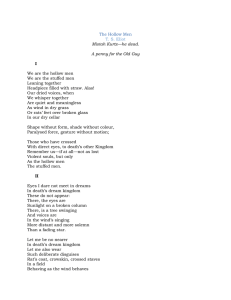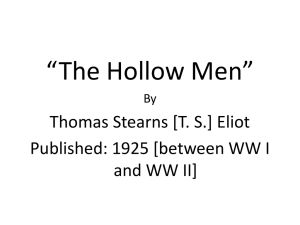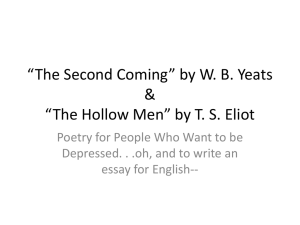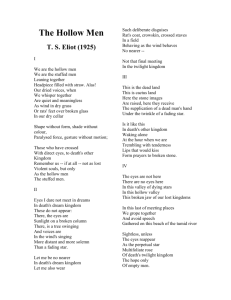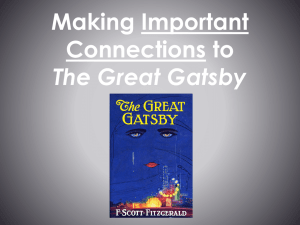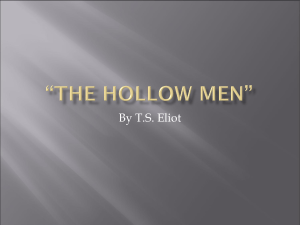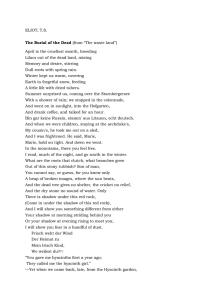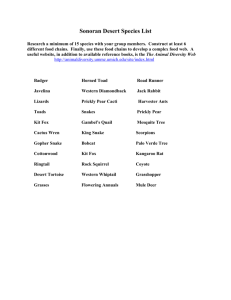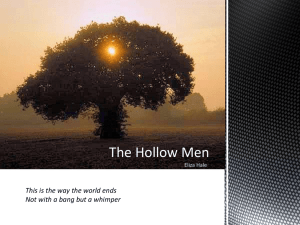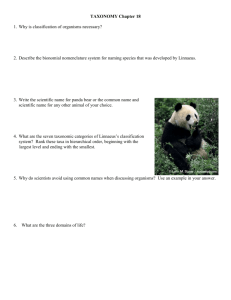Here - WordPress.com
advertisement
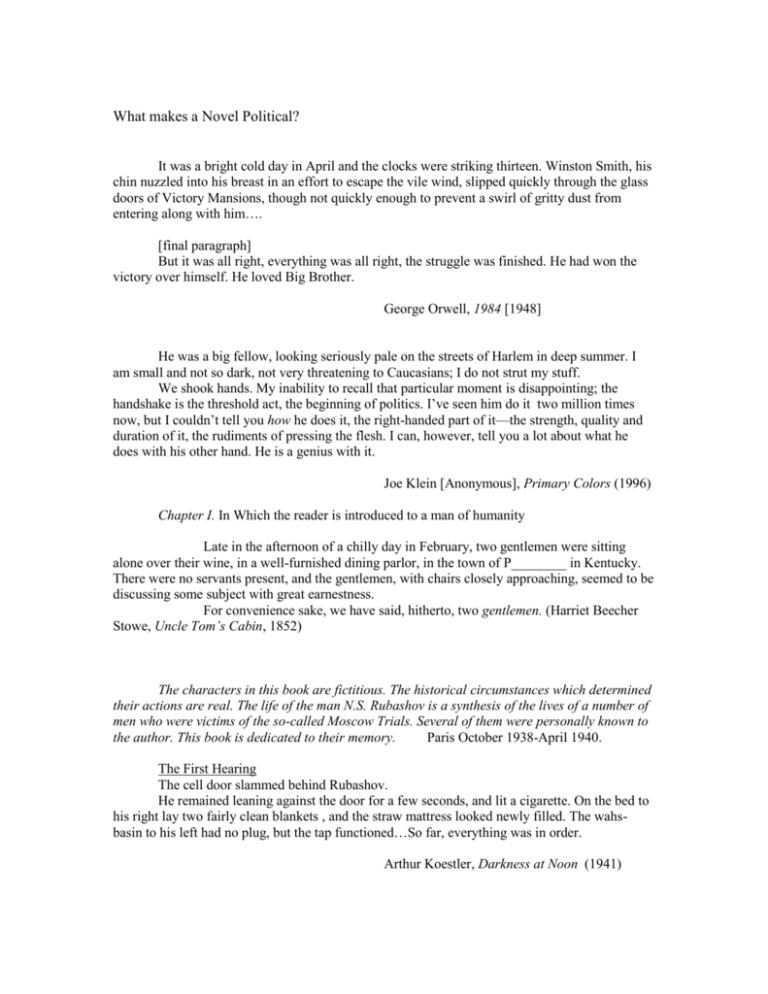
What makes a Novel Political? It was a bright cold day in April and the clocks were striking thirteen. Winston Smith, his chin nuzzled into his breast in an effort to escape the vile wind, slipped quickly through the glass doors of Victory Mansions, though not quickly enough to prevent a swirl of gritty dust from entering along with him…. [final paragraph] But it was all right, everything was all right, the struggle was finished. He had won the victory over himself. He loved Big Brother. George Orwell, 1984 [1948] He was a big fellow, looking seriously pale on the streets of Harlem in deep summer. I am small and not so dark, not very threatening to Caucasians; I do not strut my stuff. We shook hands. My inability to recall that particular moment is disappointing; the handshake is the threshold act, the beginning of politics. I’ve seen him do it two million times now, but I couldn’t tell you how he does it, the right-handed part of it—the strength, quality and duration of it, the rudiments of pressing the flesh. I can, however, tell you a lot about what he does with his other hand. He is a genius with it. Joe Klein [Anonymous], Primary Colors (1996) Chapter I. In Which the reader is introduced to a man of humanity Late in the afternoon of a chilly day in February, two gentlemen were sitting alone over their wine, in a well-furnished dining parlor, in the town of P________ in Kentucky. There were no servants present, and the gentlemen, with chairs closely approaching, seemed to be discussing some subject with great earnestness. For convenience sake, we have said, hitherto, two gentlemen. (Harriet Beecher Stowe, Uncle Tom’s Cabin, 1852) The characters in this book are fictitious. The historical circumstances which determined their actions are real. The life of the man N.S. Rubashov is a synthesis of the lives of a number of men who were victims of the so-called Moscow Trials. Several of them were personally known to the author. This book is dedicated to their memory. Paris October 1938-April 1940. The First Hearing The cell door slammed behind Rubashov. He remained leaning against the door for a few seconds, and lit a cigarette. On the bed to his right lay two fairly clean blankets , and the straw mattress looked newly filled. The wahsbasin to his left had no plug, but the tap functioned…So far, everything was in order. Arthur Koestler, Darkness at Noon (1941) Okonkwo was well known throughout the nine villages and even beyond. His fame rested on solid personal achievements. As a young man of eighteen he had brought honor to his village by throwing Amalinze the Cat. …. [final paragraph] As [The Commissioner] walked back to the court he thought about [his] book. Every day brought him some new material. The story of this man who had killed a messenger and hanged himself would make interesting reading. On e could almost write a whole chapter on him. Perhaps not a whole chapter, but a reasonable paragraph, at any rate. There was so much else to include, and one must be firm in cutting out details. He had already chosen the title of the book, after much thought: The Pacification of the Primitive Tribes of the Lower Niger. Chinua Achebe, Things Fall Apart (1959) It is a truth universally acknowledged, that a single man in possession of a good fortune, must be in want of a wife. However little known the feelings or views of such a man may be on his first entering the neighborhood, this truth is so well fixed in the minds of the surrounding families, that he is considered as the rightful property of some one or other of their daughters. “My dear Mr Bennet,” said his lady to him one day, “have you heard that Netherfield Park is let at last?” Jane Austen, Pride and Prejudice, (1811) The Nellie, a crusing yawl, swung to her anchor without a flutter of the sails and was at rest. The lood had made, the wind was nearly calm, and being bound down the river the only thing for it was to come to and wait for the turn of the tide….. [first line of dialogue] “And this also,” said Marlowe suddenly, “has been one of the dark places of the earth.” When the author of this narrative was collecting his data in the homeland of his hero, Nikola Suhaj the Invulnerable, he heard the testimony of a great number of respectable and trustworthy citizens who had known Suhaj personally. He had no reason to doubt their story: Suhaj (who had robbed the rich and given to the poor, and who never, except in self-defense or out of just revenge, had killed a fellow man) had been rendered invulnerable by a green bough which he had waved about, warding off gendarmes' bullets as a farmer on a July day might shoo the swarming bees. Ivan Olbracht, Nikola the Outlaw, (1933) The story that I am about to tell, a story born in doubt and perplexity, has only the misfortune (some call it the fortune) of being true: it was recorded by the hands of honorable people and reliable witnesses. But to be true in the way its author dreams about, it would have to be told in Romanian, Hungarian, Ukrainian, or Yiddish; or, rather, in a mixture of all these languages. Danilio Kis, A Tomb for Boris Davidovich, (1976) The Hollow Men (1925) T. S. Eliot Mistah Kurtz—he dead. A penny for the Old Guy I We are the hollow men We are the stuffed men Leaning together Headpiece filled with straw. Alas! Our dried voices, when We whisper together Are quiet and meaningless As wind in dry grass Or rats’ feet over broken glass In our dry cellar Shape without form, shade without colour, Paralysed force, gesture without motion; Those who have crossed With direct eyes, to death’s other Kingdom Remember us—if at all—not as lost Violent souls, but only As the hollow men The stuffed men. II Eyes I dare not meet in dreams In death’s dream kingdom These do not appear: There, the eyes are Sunlight on a broken column There, is a tree swinging And voices are In the wind’s singing More distant and more solemn Than a fading star. Let me be no nearer In death’s dream kingdom Let me also wear Such deliberate disguises Rat’s coat, crowskin, crossed staves In a field Behaving as the wind behaves No nearer— Not that final meeting In the twilight kingdom III This is the dead land This is cactus land Here the stone images Are raised, here they receive The supplication of a dead man’s hand Under the twinkle of a fading star. Is it like this In death’s other kingdom Waking alone At the hour when we are Trembling with tenderness Lips that would kiss Form prayers to broken stone. IV The eyes are not here There are no eyes here In this valley of dying stars In this hollow valley This broken jaw of our lost kingdoms In this last of meeting places We grope together And avoid speech Gathered on this beach of the tumid river Sightless, unless The eyes reappear As the perpetual star Multifoliate rose Of death’s twilight kingdom The hope only Of empty men. V Here we go round the prickly pear Prickly pear prickly pear Here we go round the prickly pear At five o’clock in the morning. Between the idea And the reality Between the motion And the act Falls the Shadow For Thine is the Kingdom Between the conception And the creation Between the emotion And the response Falls the Shadow Life is very long Between the desire And the spasm Between the potency And the existence Between the essence And the descent Falls the Shadow For Thine is the Kingdom For Thine is Life is For Thine is the This is the way the world ends This is the way the world ends This is the way the world ends Not with a bang but a whimper. It was in this darkness that abruptly, with many loud noises, we stopped. There were shouts from the barge, the dugouts with us, and from many parts of the steamer. Young men with guns had boarded the steamer and tried to take her over. But they had failed; one young man was bleeding on the bridge above us. The fat man the captain, remained in charge of his vessel. We learned that later. At the time what we saw was the steamer searchlight, playing on the riverbank, playing on the passenger barge, which had snapped loose and was drifting at an angle through the water hyacinths at the edge of the river. The searchlight lit up the barge passengers who, behind bars and wire guards, as yet scarcely seemed to understand that they were adrift. Then there were no gunshots. The searchlight was turned off; the barge was no longer to be seen. The steamer started up again and moved without lights downt he river, away from the area of battle. The air would have been full of moths and flying insects. The searchlight, while it was on, had shown thousands, white in the white light. V.S. Naipaul, A Bend in the River final lines (1978) It was, gentleman, after a long absence—seven years to be exact, during which time I was studying in Europe—that I returned to my people. I learnt much and much passed me by—but that’s another story. The important thing is that I returned with a great yearning for my people in that small village at the bend of the Nile. For seven years I had longed for them, had dreamed of them, and it was an extraordinary moment when I at last found myself standing amongst them. They rejoiced at having me back and made a great fuss, and it was not long before I felt as though a piece of ice were melting inside fo me, as though I were some frozen substance on which the sun had shone—that life warmth of the tribe which I had lost for a time in the land “whose fishes die of the cold.” My ears had become used to their voices, my eyes grown accustomed to their forms. Because of having thought about them during my absence, something rather like fog rose up between me and them the first instant I saw them. Tayeb Al-Salih, Season of Migrations to the North (1967, in Arabic)
